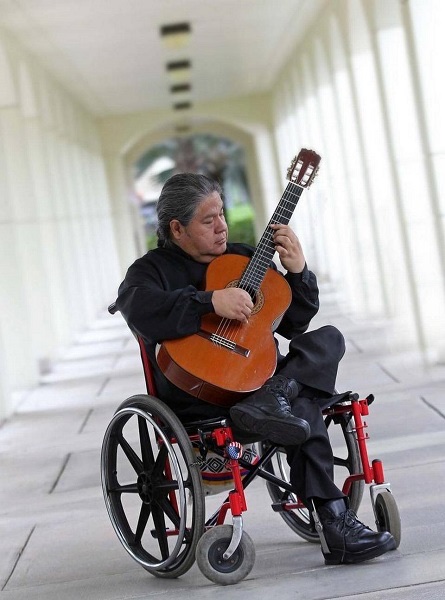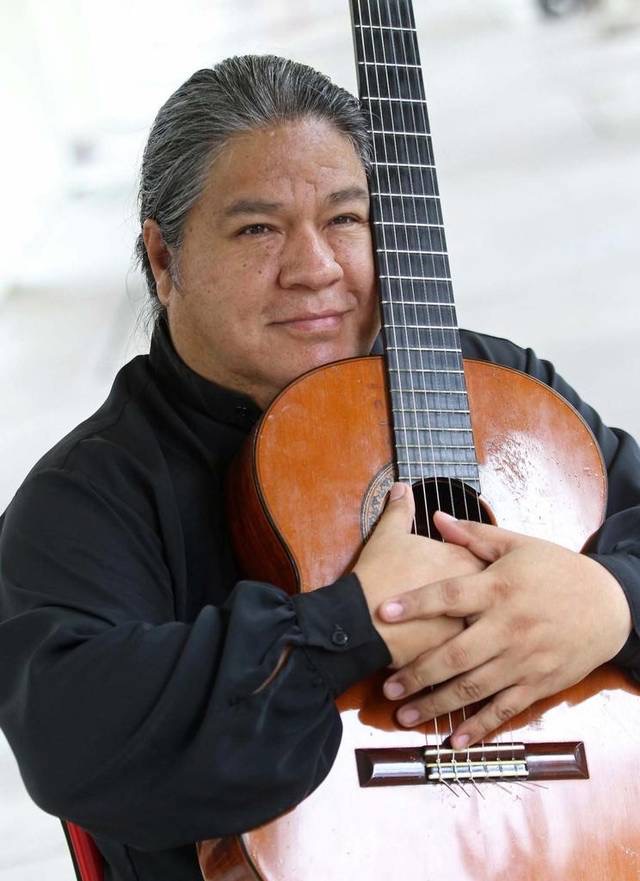

At an intimate performance in the Clarke Recital Hall, Frost School of Music graduate Fabian Carrera entranced his audience with a dextrous classical guitar performance that invoked the indigenous music of his home country, Ecuador.
On April 2 —during his performance that marked the end of National Disability Awareness Month — Carrera, 52, completed the first phase of his Doctor of Music Arts (DMA) degree, which consists of three recitals held over three years. While his skillful performance would be a triumph for any musician, Carrera’s recital is particularly significant as it marks yet another victory over the difficult odds dealt to him during childhood.
As a child, Carrera contracted polio and was paralyzed from the neck down. Carrera was released from an iron lung at 5 years old.
With help from doctors, physical therapists, and family, he regained the usage of his upper body. With the regained use of his arms, Carrera picked up what would become his life long passion: the guitar.
In a press release published before the April 2 recital, Carrera credits his father Ulpiano for his interest in guitar, detailing how his father purchased his first instrument and encouraged him to pursue music lessons. As Carrera honed his art, he was presented with increasingly prestigious opportunities and accolades, including a guest spot in the National Symphonic Orchestra of Ecuador in 1996 and a formal recognition by the Ecuadorian government for artistic merit in March 2020.
Despite his achievements in his home country, Carrera made the decision to move to the United States as an adult to pursue opportunities that were not available to him in Ecuador. Many of these limitations are the result of a negative cultural perception of disabled individuals in Ecuador.
“People that are disabled, they’re generally hidden away,” said Carrera’s wife, Deb. “They’re encouraged to live with their parents in a room, they’re not to be seen.”
In the United States, Carrera continued to study music. Carrera earned a masters’ degree in classical guitar from the Frost school in 2021 after studying under guitar program director Rafael Padron. Before enrolling in Frost, he also studied social work at Miami-Dade College. After finishing his masters’ degree, Carrera immediately began work on his doctoral degree, preparing for his first of three recitals in early April.
Despite his many accomplishments, Carrera said that his talents would not be valued the same in Ecuador that they are here because of his disability.
“Coming from Ecuador, there is a lot of discrimination,” Carrera said. “They think it’s going to be a hassle hiring a person with a disability and they disregard all of his qualifications, his diplomas, his degrees.”

Of the many performances that Carrera has finished over the course of his career, he notes his most recent doctoral recital as a personal milestone and a display of an invaluable piece of the Ecuadorian musical canon.
At the recital, Carrera performed three pieces composed by Carlos Bonilla-Chavez, an award-winning Ecuadorian composer and Carrera’s former guitar teacher during his adolescence, who he considers to be the “father of Ecuadorian classical guitar.” The three songs —“Raíces” accompanied by pianist Dora Galit Chen, “Preludio y Yumbo” and “Zapateado Ecuatoriano”— showcased Carrera’s talents and left his audience in awe.
Carrera was particularly passionate about performing “Raíces,” a guitar concerto.
“Besides the sentimental value, it is the first nationalistic concerto for guitar ever written in Ecuador,” Carrera said.
The piece’s transitions through three movements, each of which is symbolic of the country’s diverse and syncretic culture. The first movement is an Allegro based on the music of the indigenous Otavo people who reside in the Andes mountains, as well as the country’s diverse “cultura mestiza.”
The second movement is a traditional Pasillo, or waltz, set to a slower Adagio tempo. The somber tone represents the plight of the indigenous people at the hands of colonizers. The third movement is inspired by the traditional Yumbo war dance and features a faster Presto tempo, but is meant to inspire unity between the indigenous and mestizo people.
Carrera said that he hopes his music will shed light on the beauty and vibrancy of Ecuadorian life that is often overshadowed in the mainstream media. Carrera’s wife said that this positive approach is also his philosophy regarding his disability.
“My husband wants to emphasize that he is not a victim, and that even though he is in a wheelchair, life goes on,” Deb said.
Carrera also credits much of his personal, musical and academic accomplishment to his Christian faith.
“The thing that makes me proud is my faith in God, and all the strength that he gives me to achieve all the things that I have done,” Carrera said.
Carrera’s faith has also inspired him to become involved with local charity work; he regularly performs free concerts at Miami hospitals with the Ress Family Hospital Performance Project. He plans to continue to share his love of guitar and give back to his community by pursuing a career as a professor after completing his DMA.
Currently, he is preparing for the next phase of his doctoral degree, and hopes to finish within 3 years.





